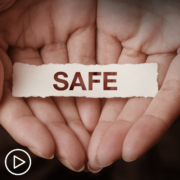Tag Archive for: colorectal cancer
What Can Patients Do to Access Better Colon Cancer Care?
What Can Patients Do to Access Better Colon Cancer Care? from Patient Empowerment Network on Vimeo.
What can patients do to access quality colon cancer care? Dr. Suneel Kamath shares tips on how to advocate for yourself, the importance of quality care versus convenient care, and colon cancer resources.
Dr. Suneel Kamath is a medical oncologist at the Cleveland Clinic Cancer Institute. Learn more about Dr. Kamath.
See More from DETECT Colon Cancer
Related Resources:
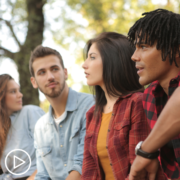
|
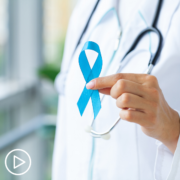
|
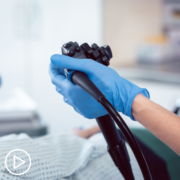
|
Transcript:
Katherine:
If patients feel like they’re not receiving good care or they feel like they’re being treated unfairly, what steps should they take to access better overall care?
Dr. Kamath:
That’s a touchy one. It makes me sad that that even happens, but it does. I would say just never be afraid to be an advocate for yourself. To me, it’s your life and the consequence of bad healthcare, unfortunately, is not going to be on those providers. It’s going to be on you. Unfortunately, I do hear from a lot of people they worry about burning bridges, or annoying someone, or angering the doctors that they’re working with. I would tell them, “Don’t worry about that.” I don’t think people need to care about my feelings or the doctor’s feelings about the situation.
You need to make sure you’re getting the best healthcare possible. Always feel comfortable getting a second opinion, going to a bigger center. I always recommend go to the main hospitals in your area. In the U.S. especially, I think we’re too focused on convenient healthcare and not the quality of the healthcare. I would definitely advocate, even if it takes you an hour to drive downtown to Duke or Johns Hopkins in your area, or the Cleveland Clinic, or the Mayo Clinic, or whatever, it’s worth that time compared to the person who just might be five or 10 minutes from you.
Katherine:
Right. Are there resources available now that might be useful for people who need, want more information?
Dr. Kamath:
Yes, are you talking about things that they could find online or read about? It’s in terms in of accessing care or just generally about …
Katherine:
Yeah, accessing care.
Dr. Kamath:
Yeah. I think there, again, I would go back to the American Cancer Society. The other ones that are really great, too, are – for colorectal cancer, especially, there are a number of really great patient advocacy organizations. The two that are coming to mind are the Colorectal Cancer Alliance and then Fight CRC. Both of them have phenomenal resources as far as patients who have gone through the whole journey and various phases of the journey. What I love for them, too, is usually there’s somebody that can represent your area in those settings, in those support groups and whatnot.
I definitely think they’re a great resource in helping people find out who are the best doctors in your area. How did you get connected with them? Unfortunately, we all have phone numbers online and whatnot to find us. But we all know when you call them you end up in this interminable loop, it seems like, sometimes to get an appointment. It’s hard to navigate it all. I think a lot of times these patient advocacy organizations can be great bridges to both finding who the right people are and how do you best get in with them.
What Are Common Colon Cancer Health Disparities?
What Are Common Colon Cancer Health Disparities? from Patient Empowerment Network on Vimeo.
What are common colon cancer health disparities? Dr. Suneel Kamath explains what a health disparity is, the groups impacted by these differences, and how the medical community addresses them in colon cancer care.
Dr. Suneel Kamath is a medical oncologist at the Cleveland Clinic Cancer Institute. Learn more about Dr. Kamath.
See More from DETECT Colon Cancer
Related Resources:
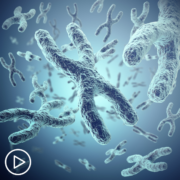
|
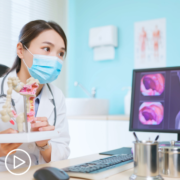
|

|
Transcript:
Katherine:
Disparities in healthcare can impact a patient’s experiences and outcomes. What are some common health disparities?
Dr. Kamath:
Yeah, there are so many. I think with colorectal cancer in particular, access is really a huge one. People who are in underserved communities, often people of color, have less access due to systemic racism in healthcare and in insurance, lack of opportunity with employment. I’ve always thought having a purely employer-based healthcare system is not the smartest idea.
People who are often the sickest are the least able to work and the least able to maintain their health insurance. It does a disservice to our population to have thing set up that way. Yeah, I think that’s a huge barrier. I think there’s also a lot of stigma, especially amongst people of color, around colonoscopies, things to do with your colon and rectum and whatnot. I think that’s something we also need to work on, to normalize that as something that should be done regularly and that this isn’t a bad thing. It’s just something we all have to do.
Katherine:
Right. Well, what is being done by the medical community to address these imbalances?
Dr. Kamath:
I’ve really seen, I think, a legitimate push towards community outreach in the last few years. Unfortunately, we’ve known about these disparities for decades and I think a lot has been said about addressing them since the ‘80s and ‘90s.
But to be honest with you, I don’t think very much was really done until recently. What I’ve seen is a really concerned effort to put resources into identifying what are those barriers. Where is the distrust coming from? Who are trusted sources in your community? We’re tapping into pastors and preachers and the barbershop guy. You don’t ask people, “Who do you trust to get your information from?” If you don’t ask the question you’re never going to know.
Recently, I think we’ve actually really done the work to find out what is going to motivate you to get something done? What’s going to make it feel normal to you and having trust healthcare? We’re seeing a lot more engagement, I think, as a result of that.
Katherine:
Are members of the medical community going out into the African American community to find out who they should be talking to?
Dr. Kamath:
We have been, actually. I reviewed a grant – just to speak of Cleveland Clinic in particular, a couple of years ago that the project that is being funded by it is still ongoing. Basically, we conducted focus groups of people at church. After the service was done, we conducted a focus group to ask them, “What are your thoughts about screening?” It was for colon cancer and for others as well. “What are your thoughts about this? What are your fears about it? What are things we could do to make you feel more comfortable with accessing this part of your care? Who do you go to to get trusted information?”
As a result of that, doing it in their community, in the church setting where they feel safe and comfortable, we saw significant spike in the number of people who came for colonoscopies, for mammograms. We do PSA testing there and we set up a lab there. We found a big spike in the number of people who got those things done and we identified quite a few people who had cancer at early stages and we were able to cure them at much earlier stages than otherwise.
What Is the Role of Genetic Testing in Colon Cancer Care?
What Is the Role of Genetic Testing in Colon Cancer Care? from Patient Empowerment Network on Vimeo.
Dr. Suneel Kamath discusses the role of genetic testing in managing colon cancer. From understanding hereditary mutations to the significance of family history, learn why awareness is important.
Dr. Suneel Kamath is a medical oncologist at the Cleveland Clinic Cancer Institute. Learn more about Dr. Kamath.
See More from DETECT Colon Cancer
Related Resources:
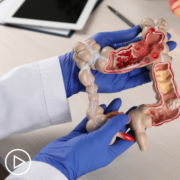
|

|

|
Transcript:
Katherine:
Where does hereditary testing or genetic counseling come in as a screening tool?
Dr. Kamath:
Hereditary testing, I think, is so important. I wouldn’t say it’s the best screening tool. It’s often best once somebody has already been diagnosed and you know that the disease is in the family. I do think it’s really, really important for people who have a family history of any cancer. Again, I go back to the fact that I think a lot of us don’t really know our family histories. I find for a lot of people when they’re first diagnosed with a cancer, that’s the first time they go talk to Mom and Dad, and to Uncle Joe Aunt Shirley, and they say, “Hey, do we have anything like this in the family?”
And it actually turns out – I often hear the second and third visits, “It actually turns out I do have a strong family history of cancer.” I just urge people that it’s not an easy thing to talk about, but have that conversation with your family. Also, be open to sharing that information if it was you because these things have heavy implications on everyone in your entire family.
Also, importantly, it doesn’t have to be the same cancer. A lot of people think it’s only if you have a family history of colorectal cancer that you might be at increased risk of others. But there are many syndromes that link uterine with colorectal and stomach and breast and whatnot. Being aware of any family history of cancer can really help us trigger the right genetic testing to find out if you have a hereditary syndrome or not.
What Are Colon Cancer Screening Guidelines?
What Are Colon Cancer Screening Guidelines? from Patient Empowerment Network on Vimeo.
What are the guidelines for colon cancer screening? Dr. Suneel Kamath explains the current recommendations, including the appropriate screening age and reviews risk assessment based on factors such as family history and race.
Dr. Suneel Kamath is a medical oncologist at the Cleveland Clinic Cancer Institute. Learn more about Dr. Kamath.
See More from DETECT Colon Cancer
Related Resources:

|

|

|
Transcript:
Katherine:
It seems like the suggested ages for screening may vary based on gender and race and family history. What are the current screening guidelines?
Dr. Kamath:
The current screening guidelines that are unfortunately due this rise, there is now recommendation for starting colon cancer screening at age 45. That’s really for everybody. There are certain people that really should be screened even earlier. We definitely know that the black community is affected at a higher rate. There are some professional societies, like the AGA or ACG, that actually recommend starting even earlier in the black community, maybe even by age 40.
And then, the other thing I always try to emphasize is with this is the usual screening guidelines that we talk about are for what we call the average risk population. I do think that we overestimate how many people are average risk. One of the things that I think is not talked about as much is that if you have a family history of even polyps – high risk polyps – that also means that your family members should get screened earlier, 10 years earlier, than the age that you were found to have a high-risk polyp.
But my experience has been most people don’t share with their families that they had those. Let’s say I had a colonoscopy done one day and they found those, they get taken out, and they just say, “Oh, come back in three years,” instead of 10. As far as I’m concerned, that’s where it ends. But actually, the fact that I had those polyps has implications for my siblings, for children, and everything. I don’t think most people are in the habit of disseminating that information. As a result of that, a lot of people are probably at increased risk and they’re really not aware of it.
Katherine:
Yeah. Where can patients find the most up-to-date information regarding screening?
Dr. Kamath:
The best resource, to me, is the American Cancer Society, their websites. They’re highly reliable, they’re easy to understand, and I find that they’re very balanced. They’re not going to be overly pushing one side or the other. But they’re going to be evidence-based. As we all know, there is so much fake news and misinformation out there, especially when it comes to health. I think having a resource you could really trust and understand is key and the American Cancer Society, you find, is an excellent resource.
Why Are Colon Cancer Cases in Young People on the Rise?
Why Are Colon Cancer Cases in Young People on the Rise? from Patient Empowerment Network on Vimeo.
Why are colon cancer cases rising among young people? Dr. Suneel Kamath delves into the risk factors, early symptoms of colon cancer, and the importance of consulting with your doctor.
Dr. Suneel Kamath is a medical oncologist at the Cleveland Clinic Cancer Institute. Learn more about Dr. Kamath.
See More from DETECT Colon Cancer
Related Resources:

|

|

|
Transcript:
Katherine:
Well, colon cancer cases in young people are on the rise. Do we know why this is happening?
Dr. Kamath:
Yeah, honestly, we really don’t to this point. We have a lot of hypotheses that we’re investigating to get to the bottom of that but it does seem like some of the usual risk factors for developing colon cancer later in life are still true. Obesity, sedentary lifestyle, a diet that’s high in red meat, processed foods. I do think to some extent the fact that we’re doing these things earlier and earlier in our lives. I think we’re seeing that the rates of obesity and overweight are not just increasing but they’re also occurring in people’s teenage years and in their 20s and 30s.
It’s a time dependent process. I do think some people being at a higher than healthy body weight and leading a sedentary lifestyle starting at age 10 may lead to a cancer by age 30 or 40. I do think that’s part of it. But I do think there’s probably some other undescribed factor. We know plenty of people who come in who are runners and healthy, and honestly they’re healthier than I am to be honest with you and they still develop this for no reason. I am sure there’s some other exposure that we still need to identify.
Katherine:
What symptoms should young people be paying attention to?
Dr. Kamath:
It’s a great question. Fortunately, with early onset colorectal cancer, it’s much more likely to be on the left side of the colon, or closer to the exit, if you will.
The good thing about that is the symptoms of it can be a little bit easier to detect. A lot of people describe to me that they have more blood in their stool. They found that they were straining harder than normal or having had a thinner stool caliber. I would also emphasize that these are often symptoms that go on for weeks and months at a time. All of us might eat the wrong thing for a day or two and get some stomach issues here or there so I don’t want people to overreact to every little symptom.
Certainly, if you’re having constipation that’s going on for several weeks in a row, that’s often not going to be a benign thing. If you have that type of symptom and it’s persistent, definitely talk to your doctor and get it checked out.
Research Advances in Colon Cancer Screening and Detection
Research Advances in Colon Cancer Screening and Detection from Patient Empowerment Network on Vimeo.
What are the latest research advances in colon cancer screening and detection? Dr. Suneel Kamath explores cutting-edge screening modalities, including a noninvasive test and innovative blood tests.
Dr. Suneel Kamath is a medical oncologist at the Cleveland Clinic Cancer Institute. Learn more about Dr. Kamath.
See More from DETECT Colon Cancer
Related Resources:

|

|

|
Transcript:
Katherine:
The American Society of Clinical Oncology annual meeting just wrapped up. What were the highlights from the meeting related to colon cancer screening and detection?
Dr. Kamath:
This was some evidence that came out prior to the meeting but there was quite a bit of buzz about it at ASCO itself. There’s a number of new screening modalities that have obtained their FDA approvals or have had major data releases for, which have looked extremely promising. The first one that comes to mind is the ColoSense test. This is an RNA-based stool test. It’s a stool test similar to Cologuard but it’s a slightly different technology where it’s using RNA instead of DNA like Cologuard did.
Similar to many of the other tools, it’s showing excellent performance in terms of how sensitive it is to detecting colon cancer. They showed in a prior publication they could detect almost 95 percent of colorectal cancers. It was also a rather specific test, too, so 88 percent specificity. What this is telling us is that this test if very good at detecting colorectal cancer when it’s there but also, equally importantly, it’s very good at not giving you a false positive, which is also very important with any screening test.
So, we’re really excited to see that. We’re increasingly thinking about noninvasive ways, beyond colonoscopy, that we can improve colon cancer screening.
Katherine:
How does it compare with Cologuard, then?
Dr. Kamath:
This one is called ColoSense, yeah. I would say both of these numbers in terms of the sensitivity, meaning that’s the level of detection. If someone does have colorectal cancer, how well do you detect that. That sensitivity of almost 95 percent is definitely a little bit higher. Specificity is also, I would say, a little bit higher. I do think that this test would likely both detect more colorectal cancers that Cologuard would and it would also give you fewer false positives at the same time.
Katherine:
And is this going to be something that people can take the test at home?
Dr. Kamath:
Yes. This should be because it says a stool-based test. I’m sure a lot of the logistics would still need to be worked out, as with any new test. Having the kit sent to the primary care doctors’ offices and things like that. Arranging for that infrastructure, I’m sure, will take some time. But, yes, this test is pretty easy and simple to do. It should be the same as sending in any other stool-based test into a lab.
Katherine:
Is there other research you’re excited about?
Dr. Kamath:
Yes. Another one that I’m really excited about is there are these blood-based screening tests as well. A couple are coming to mind. One is from Guardant Health. They have been developing this assay specific for colorectal screening for some time. They’ve also been talking about their data for a blood-based test.
For them, the number is also still quite good. They’re saying that the sensitivity is about 83%, so maybe a little bit lower than the RNA one but specificity is 90 percent. So, maybe actually a little bit better with that. So, I’m very excited about this one because this is a blood-based test that could be done at a doctor’s office. We all know practicalities are if you can just order a test in the lab and have someone get a draw the same as getting your lipid panel checked or other things that are routinely done, that’s very easy to do and you can be pretty certain someone’s going to follow through on that.
Whereas, we know with these stool-based tests, it’s about a third to half of patients, even though you send them home with a kit, you may not get the specimen back at all.
Full Circle Discussion with Jessica Catlin Replay
Jessica Full Circle Discussion Replay from Patient Empowerment Network on Vimeo.
Jessica Catlin, our Colon Cancer Empowerment Lead takes a deep dive into her memoir, Full Circle: How Politics, Depression, and Yoga Helped Me Crush Colorectal Cancer and Crisis. Her book is dedicated to people living with colorectal cancer, care partners, anyone impacted by mental health challenges, and anyone seeking inspiration for meeting–and crushing–crisis. Tune into this replay to hear this engaging conversation with Jessica and others as she shares her story and answers questions.
This program was aired in a meeting format so attendees had the option of having their camera on or off. Some voices you hear may be off camera.
Full Circle: How Politics, Depression, and Yoga Helped Me Crush Colorectal Cancer and Crisis Synopsis
At first, the doctors didn’t believe anything was wrong. Jessica was a politically active, self-aware, health-conscious student of yoga, and the doctors dismissed her bloody stool as a likely hemorrhoid. But nearly one year after she originally sought help, 39-year-old Jessica finally got the life-threatening results: She had Stage 3 colorectal cancer.
In the year that followed, Jessica endured chemoradiation, cancer surgery, ostomy surgery, chemotherapy, and ostomy reversal surgery as well as managing her preexisting mental health conditions. She blogged about the experience every step of the way, giving her readers a window into the fight of her life and encouragement for meeting their own challenges.
Full Circle: How Politics, Depression, and Yoga Helped Me Crush Colorectal Cancer and Crisis is an intimate, page-turning look at one woman’s battle with young-onset colorectal cancer, just as the incidence of this disease is on the rise among the under-40 population. Furthermore, Jessica addresses head-on the additional challenges–and advantages–of being a mental health patient and contrasts the medical system’s treatment of cancer and depression.
This book is dedicated to colorectal cancer patients and caregivers, mental health patients and caregivers, and anyone seeking inspiration for meeting–and crushing–crisis.
You’ve Chosen to Participate In a Clinical Trial: What Are Next Steps?
You’ve Chosen to Participate in a Clinical Trial: What Are Next Steps? from Patient Empowerment Network on Vimeo.
What is it like to participate in a clinical trial? Dr. Pauline Funchain of Cleveland Clinic explains what to expect when joining a clinical trial and colorectal cancer survivor Cindi Terwoord shares her personal experience.
Katherine Banwell:
Dr. Funchain, once a patient like Cindi decides to participate in a trial, what happens next?
Dr. Pauline Funchain:
So, there is a lot, actually, that happens. So, there is a lead-in period to a trial. So, once you decide, it’s not like you can start tomorrow on a trial drug. What happens really, there’s a whole safety lead-in that we call an enrollment period, where there’s a long checklist of making sure that a person is healthy, and there’s nothing – no organ or anything in particular – where we would be worried about this particular drug.
So, there’s a checklist, that way there are usually – sometimes there’s a new scan if the last scan is a little bit too old, just so that we know exactly what somebody looks like right when they walk into the trial and start the drug. There are usually some blood tests and procedures that come before, and some of the stuff – half of the blood is for the trial, and half of the blood is for scientist usually, so that they can work on some of the science behind what’s happening to someone on a trial, which is pretty cool.
And sometimes there is a procedure – a biopsy or something like that – that’s involved.
But, in general, the lead-in is somewhere usually between two and four weeks from the time somebody decides they’re willing to be on a trial. And there are some extra safety measures, like if you hear about a trial, you can’t go on the trial right away, there’s got to be sort of a thinking period that’s usually about 24 hours before you can literally sign your name on the line.
But, yeah, I’d expect something about two to three weeks before going on a trial. And then once folks are on a trial, it’s kind of like treatment. It’s just getting the treatments when you get the treatments. Sometimes there’s extra checks, again for safety, on drug levels and things.
Katherine Banwell:
Would you review the safety protocols in place for clinical trials?
Pauline Funchain:
Yeah, sure. So, safety is number one when it comes to trials, really. There are guardrails on guardrails on guardrails. But in any clinical trial protocol, it actually starts even before the trial starts. So, whenever somebody wants to bring in a trial, or wants to start a trial – and this is true at any academic institution, or any institution that runs trials – the trial goes through something called an IRB, or an Institutional Review Board, and that board reviews it and says, “Look, is this safe, are we harming people, are we unnecessarily coercing people?”
And they read through the whole thing. And usually there’s a protocol data monitoring committee that also looks at it, there’s usually two. And there’s a lot of checks that a trial has to go through to make sure it’s safe, and fair, for all participants. So, that happens first.
And then once the trial opens, there is continual monitoring. Every visit, every number that’s drawn. Any visit, even if the visit isn’t at the hospital that’s running the trial, even if it’s at a local urgent care, all of those things end up getting reported back, and there’s a whole team of people besides.
So, a patient will see the doc, or the nurse, or maybe sometimes a research coordinator, research assistant. But then there are all these research coordinators that sit in offices that review everything, put it in the computers, and then record everything that happens to someone on the trial.
And all of that data actually goes to an external review organization, a clinical trial research organization. And what they do is, they look over all of the data also. So, it’s not just internal people checking, because internal people may be biased for the people that pay them, right?
Katherine Banwell:
Right.
Dr. Pauline Funchain:
All of that data goes to an external monitoring board also, to make sure that everything is going the way it’s supposed to go.
Katherine Banwell:
Yeah. Cindi, in your experience, did you feel like safety was a priority?
Cindi Terwoord:
Oh, definitely, definitely, yeah. They were very, very careful. Mine was a two-part; I had a vaccine along with this nivolumab (Opdivo).
And so, they would have to give me the vaccine, sit there and stare at me, to make sure I didn’t faint or something, and that was a good half-hour.
Then I got the immunotherapy, and I’d have to wait an hour after that before I started on the chemotherapy.
Katherine Banwell:
Oh.
Cindi Terwoord:
Yeah, they were in there watching me like a hawk, and I felt very safe, I really did.
Katherine Banwell:
Dr. Funchain, what are a patient’s rights when they participate in a trial?
Dr. Pauline Funchain:
So, the most important thing, I think, that Cindi mentioned before is, a patient can withdraw at any time. Any time. They can sign the paperwork, and the next second decide not to. They can be almost to the end of the trial and decide that they want to come off. The last word is always with the patient.
I think the other thing, in terms of safety, you can see – so every patient before starting a trial gets an informed consent. It is multiple pages, there’s a lot of legalese in it.
But they do try their best to make it as readable and understandable as possible, so that people can, even if they don’t have a medical background, kind of understand what they’ve gotten. The mechanism of what they’ve gotten, and what new drug they’re getting, and generally what are the risks and benefits.
For instance, let’s say there’s genetic testing involved, there’s always clauses that tell you what that means, and how protected your genetic information is, that kind of stuff.
So, it’s a very long thing. And again, once someone gets that, they have to have a certain amount of time before they can sign on the line. So, I think information education, and then the ability to come off if they find necessary.
Katherine Banwell:
Yeah. What happens after a trial is completed? Is a patient monitored? And if so, how?
Dr. Pauline Funchain:
So, that depends on the trial.
Most trials do monitor after either the drug is complete, or the course is complete for a certain amount of time, and it depends on the trial. For some trials, it’s six months after; for some trials, it’s years afterwards. So, in melanoma, we have a trial that just reported out their 7-1/2-year follow-up. But it was actually the first immunotherapy combination of its kind that involved the drug that you had to need nivolumab.
So, it is pretty cool. I mean, that combination changed the face of what patients with melanoma could come to expect from their treatment, so we’re all very interested to know what that kind of follow-up is. But, yeah, it depends on the trial.
A Patient’s Perspective | Participating in a Clinical Trial
A Patient’s Perspective | Participating in a Clinical Trial from Patient Empowerment Network on Vimeo.
Colorectal cancer survivor Cindi Terwoord recounts her clinical trial experience and explains why she believes patients should consider trial participation.
Dr. Pauline Funchain is a medical oncologist at the Cleveland Clinic. Dr. Funchain serves as Director of the Melanoma Oncology Program, co-Director of the Comprehensive Melanoma Program, and is also Director of the Genomics Program at the Taussig Cancer Institute of the Cleveland Clinic. Learn more about Dr. Funchain, here.
Cindi Terwoord is a colorectal cancer survivor and patient advocate. Learn more about Cindi, here.
See More from Clinical Trials 101
Related Resources:

|
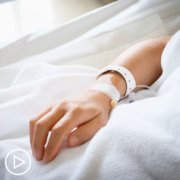
|
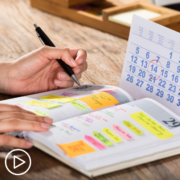
|
Transcript:
Katherine Banwell:
Cindi, you were diagnosed with stage IV colorectal cancer, and decided to participate in a clinic trial. Can you tell us about what it was like when you were diagnosed?
Cindi Terwoord:
Yeah. That was in September of 2019, and I had had some problems; bloody diarrhea one evening, and then the next morning the same thing. So, I called my husband at work, I said, “Things aren’t looking right. I think I’d better go to the emergency room.”
And so, we went there, they took blood work – so I think they knew something was going on – and said, “We’re going to keep you for observation.” So, then I knew it must’ve been something bad. And so, two days later, then I had a colonoscopy, and that’s when they found the tumor, and so that was the beginning of my journey.
Katherine Banwell:
Mm-hmm. Had you had a colonoscopy before, or was that your first one?
Cindi Terwoord:
No, I had screenings, I would get screenings. I had heard a lot of bad things about colonoscopies, and complications and that, so I was always very leery of doing that. Shame on me. I go for my other screenings, but I didn’t like to do that one. I have those down pat now, I’m very good at those.
Katherine Banwell:
Yeah, I’m sure you do. So, Cindi, what helped guide your decision to join a clinical trial?
Cindi Terwoord:
Well, I have a friend – it was very interesting.
He was probably one of the first people we told, because he had all sorts of cancer, and he was, I believe, one of the first patients in the nation to take part in this trial. It’s nivolumab (Opdivo), and he’s been on it for about seven years. And he had had various cancers would crop up, but it was keeping him alive.
And so, frankly, I didn’t know I was going to have the option of a trial, but he told me run straight to Cleveland Clinic, it’s one of the best hospitals. So, I took his advice. And the first day the doctor walked in, and then all these people walked in, and I’m like, “Why do I have so many people in here?” Not just a doctor and a nurse. There was like a whole – this is interesting.
And so, then they said, “Well, we have something to offer you. And we have this immunotherapy trial, and you would be one of the first patients to try this.”
Now, when they said first patient, I’m not quite sure if they meant the first colon cancer patient, I’m not sure. But they told me the name of it, and I said, “I’m in. I’m in.” Because I knew my friend had survived all these years, and I thought, “Well, I’ve gotten the worst diagnosis I can have, what do I have to lose?” So, I said, “I’m on board, I’m on board.”
Katherine Banwell:
Mm-hmm. Did you have any hesitations?
Cindi Terwoord:
Nope. No, I’m an optimistic person, and what they assured me was that I could drop out at any time, which I liked that option.
Because I go, “Well, if I’m not feeling well, and it’s not working, I’ll get out.” So, I liked that part of it. I also liked, as Dr. Funchain had said, you go in for more visits. And I like being closely monitored, I felt that was very good.
I’ve always kept very good track of my health. I get my records, I get my office notes from my doctor. I’m one of those people. I probably know the results of blood tests before the doctor does because I’m looking them up. So, I felt very confident in their care. They watched me like a hawk. I kept a diary because they were asking me so many questions.
Katherine Banwell:
Oh, good for you.
Cindi Terwoord:
I’m a transcriptionist, so I just typed out all my notes, and I’d hand it to them.
Katherine Banwell:
That’s a great idea.
Cindi Terwoord:
Here’s how I’m feeling, here’s…And I was very lucky I didn’t have many side effects.
Katherine Banwell:
In your conversations with your doctor, did you weigh the pros and cons about joining a trial? Or had you already made up your mind that yes, indeed, you were going for it?
Cindi Terwoord:
Yeah, I already said, “I’m in, I’m in.” Like I said, it had kept my friend alive for these many years, he’s still on it, and I had no hesitation whatsoever.
I wish more people – I wanted to get out there and talk to every patient in the waiting room and say, “Do it, do it.”
I mean, you can’t start chemotherapy then get in the trial. And if I ever hear of someone that has cancer, I ask them, “Well, were you given the option to get into a trial?” Well, and then some of them had started the chemo before they even thought of that.
Katherine Banwell:
Mm-hmm. So, how are you doing now, Cindi? How are you feeling?
Cindi Terwoord:
Good, good, I’m doing fantastic, thank goodness, and staying healthy. I’m big into herbal supplements, always was, so I keep those up, and I’m exercising. I’m pretty much back to normal –
Katherine Banwell:
Cindi, what advice do you have for patients who may be considering participating in a trial?
Cindi Terwoord:
Do it. Like I said, I don’t see any downside to it. You want to get better as quickly as possible, and this could help accelerate your recovery. And everything Dr. Funchain mentioned, as far as – I really never brought up any questions about whether it would be covered.
And then somewhere along the line, one of the research people said, “Well, anything the trial research group needs done – like the blood draws – that’s not charged to your insurance.” So, that was nice, that was very encouraging, because I think everybody’s afraid your insurance is going to drop you or something.
And then the first day I was in there for treatment, a social worker came in, and they talked to you. “Do you need financial help? We also have art therapy, music therapy,” so that was very helpful. I mean, she came in and said, “I’m a social worker,” and I’m like, “Oh, okay. I didn’t know somebody was coming in here to talk to me.”
But that was all very helpful, and I did get free parking for a few weeks. I mean, sometimes I’d have to remind them. I’d say, “It’s costing me more to park than to get treated.” But, yeah, like I said, I’m a big advocate for it, because you hear so many positive outcomes from immunotherapy trials, and boy, I’d say if you’re a candidate, do it.
Katherine Banwell:
Dr. Funchain, do you have any final thoughts that you’d like to leave the audience with?
Dr. Pauline Funchain:
First, Cindi, I have to say thank you. I say thank you to every clinical trial participant, everybody who participates in the science. Because honestly, whether you give blood, or you try a new drug, I think people don’t understand how many other lives they touch when they do that.
It’s really incredible. Coming into clinic day in and day out, we get to see – I mean, really, even within a year or two years, there are people that we’ve seen on clinical trial that we’re now treating normally, standardly, insurance is paying for it, it’s all standard of care. And those are even the people we can see, and there are so many people we can’t see in other centers all over the world, and people who will go on after us, right?
So, it’s an amazing – I wouldn’t even consider most of the time that it’s a personal sacrifice. There are a couple more visits and things like that, but it is an incredible gift that people do, in terms of getting trials. And then for some of those trials, people have some amazing results.
And so, just the opportunity to have patients get an outcome that wouldn’t have existed without that trial, like Cindi, is incredible, incredible.
Participating in a Clinical Trial: What You Need to Know
Participating in a Clinical Trial: What You Need to Know from Patient Empowerment Network on Vimeo.
Are you considering participating in a clinical trial? In this webinar, Dr. Pauline Funchain, cancer expert and researcher, discusses what to expect when joining a clinical trial, including patient safety and questions to ask your healthcare about trial participation. Patient advocate and colorectal cancer survivor Cindi Terwoord shares her experience and advice for other people with cancer considering joining a clinical trial.
Katherine Banwell:
Hello, and welcome. I’m Katherine Banwell, your host for today’s program. When faced with a cancer diagnosis, could a clinical trial be your best treatment option? Today, we’re going to learn all about clinical trial participation, what’s involved, and how you can work with your healthcare team to decide whether a trial is right for you.
Before we get into the discussion, please remember that this program is not a substitute for seeking medical advice. Please refer to your healthcare team about what might be best for you. All right let’s meet our guest today. Joining me is Dr. Pauline Funchain.
Dr. Funchain, welcome, would you please introduce yourself?
Dr. Pauline Funchain:
Sure. Thank you for the invitation. So, I’m Pauline Funchain, I am a medical oncologist at the Cleveland Clinic. My specialty is melanoma and skin cancers. I also lead our genomics program here at Taussig Cancer Center.
Katherine Banwell:
Excellent. Thank you so much for joining us today.
Dr. Pauline Funchain:
Thank you.
Katherine Banwell:
And here to share the patient perspective is Cindi, who is a colorectal cancer survivor. Cindi, we’re so pleased to have you with us today.
Cindi Terwoord:
Thank you, nice to be here.
Katherine Banwell:
Before we learn more about Cindi’s experience, I’d like to start with a basic question for you, Dr. Funchain. Why would a cancer patient consider participating in a clinical trial? What are the benefits?
Dr. Pauline Funchain:
So, I mean, the number one benefit, I think, for everyone, including the cancer patient, is really clinical trials help us help the patient, and help us help future patients, really.
We learn more about what good practices are in the future, what better drugs there are for us, what better regimens there are for us, by doing these trials. And ideally, everyone would participate in a trial, but it’s a very personal decision, so we weigh all the risks and benefits. I think that is the main reason.
I think a couple of other good reasons to consider a trial would be the chance to see a drug that a person might not otherwise have access to. So, a lot of the drugs in clinical trials are brand new, or the way they’re sequenced are brand new. And so, this is a chance to be able to have a body, or a cancer, see something else that wouldn’t otherwise be available.
And I think the last thing – and this is sort of the thing we don’t talk about as much – but really, because clinical trials are designed to be as safe as possible, and because they are new procedures, there’s a lot of safety protocols that are involved with them, which means a lot of eyes are on somebody going through a clinical trial.
Which actually to me means a little bit sort of more love and care from a lot more people. It’s not that the standard of care – there’s plenty of love and care and plenty of people, but this doubles or triples the amount of eyes on a person going through a trial.
Katherine Banwell:
Yeah. When it comes to having a conversation with their doctor, how can a patient best weigh the risks and benefits to determine whether a trial is right for them?
Dr. Pauline Funchain:
Right. So, I think that’s a very personal decision, and that’s something that a person with cancer would be talking to their physician about very carefully to really understand what the risks are for them, what the benefits are for them. Because for everybody, risks and benefits are totally different. So, I think it’s really important to sort of understand the general concept. It’s a new drug, we don’t always know whether it will or will not work. And there tend to be more visits, just because people are under more surveillance in a trial.
So, sort of getting all the subtilties of what those risks and benefits are, I think, are really important.
Katherine Banwell:
Mm-hmm. What are some key questions that patients should ask?
Dr. Pauline Funchain:
Well, I think the first question that any patient should ask is, “Is there a trial for me?” I think that every patient needs to know is that an option. It isn’t an option for everyone. And if it is, I think it’s – everybody wants that Plan A, B, and C, right? You want to know what your Plan A, B, and C are. If one of them includes a trial, and what the order might be for the particular person, in terms of whether a trial is Plan A, B, or C.
Katherine Banwell:
Mm-hmm. Let’s learn more about Cindi’s story. Cindi, you were diagnosed with stage IV colorectal cancer, and decided to participate in a clinic trial. Can you tell us about what it was like when you were diagnosed?
Cindi Terwoord:
Yeah. That was in September of 2019, and I had had some problems; bloody diarrhea one evening, and then the next morning the same thing. So, I called my husband at work, I said, “Things aren’t looking right. I think I’d better go to the emergency room.”
And so, we went there, they took blood work – so I think they knew something was going on – and said, “We’re going to keep you for observation.” So, then I knew it must’ve been something bad. And so, two days later, then I had a colonoscopy, and that’s when they found the tumor, and so that was the beginning of my journey.
Katherine Banwell:
Mm-hmm. Had you had a colonoscopy before, or was that your first one?
Cindi Terwoord:
No, I had screenings, I would get screenings. I had heard a lot of bad things about colonoscopies, and complications and that, so I was always very leery of doing that. Shame on me. I go for my other screenings, but I didn’t like to do that one. I have those down pat now, I’m very good at those.
Katherine Banwell:
Yeah, I’m sure you do. So, Cindi, what helped guide your decision to join a clinical trial?
Cindi Terwoord:
Well, I have a friend – it was very interesting.
He was probably one of the first people we told, because he had all sorts of cancer, and he was, I believe, one of the first patients in the nation to take part in this trial. It’s nivolumab (Opdivo), and he’s been on it for about seven years. And he had had various cancers would crop up, but it was keeping him alive.
And so, frankly, I didn’t know I was going to have the option of a trial, but he told me run straight to Cleveland Clinic, it’s one of the best hospitals. So, I took his advice. And the first day the doctor walked in, and then all these people walked in, and I’m like, “Why do I have so many people in here?” Not just a doctor and a nurse. There was like a whole – this is interesting.
And so, then they said, “Well, we have something to offer you. And we have this immunotherapy trial, and you would be one of the first patients to try this.”
Now, when they said first patient, I’m not quite sure if they meant the first colon cancer patient, I’m not sure. But they told me the name of it, and I said, “I’m in. I’m in.” Because I knew my friend had survived all these years, and I thought, “Well, I’ve gotten the worst diagnosis I can have, what do I have to lose?” So, I said, “I’m on board, I’m on board.”
Katherine Banwell:
Mm-hmm. Did you have any hesitations?
Cindi Terwoord:
Nope. No, I’m an optimistic person, and what they assured me was that I could drop out at any time, which I liked that option.
Because I go, “Well, if I’m not feeling well, and it’s not working, I’ll get out.” So, I liked that part of it. I also liked, as Dr. Funchain had said, you go in for more visits. And I like being closely monitored, I felt that was very good.
I’ve always kept very good track of my health. I get my records, I get my office notes from my doctor. I’m one of those people. I probably know the results of blood tests before the doctor does because I’m looking them up. So, I felt very confident in their care. They watched me like a hawk. I kept a diary because they were asking me so many questions.
Katherine Banwell:
Oh, good for you.
Cindi Terwoord:
I’m a transcriptionist, so I just typed out all my notes, and I’d hand it to them.
Katherine Banwell:
That’s a great idea.
Cindi Terwoord:
Here’s how I’m feeling, here’s…And I was very lucky I didn’t have many side effects.
Katherine Banwell:
In your conversations with your doctor, did you weigh the pros and cons about joining a trial? Or had you already made up your mind that yes, indeed, you were going for it?
Cindi Terwoord:
Yeah, I already said, “I’m in, I’m in.” Like I said, it had kept my friend alive for these many years, he’s still on it, and I had no hesitation whatsoever.
I wish more people – I wanted to get out there and talk to every patient in the waiting room and say, “Do it, do it.”
I mean, you can’t start chemotherapy then get in the trial. And if I ever hear of someone that has cancer, I ask them, “Well, were you given the option to get into a trial?” Well, and then some of them had started the chemo before they even thought of that.
Katherine Banwell:
Mm-hmm. So, how are you doing now, Cindi? How are you feeling?
Cindi Terwoord:
Good, good, I’m doing fantastic, thank goodness, and staying healthy. I’m big into herbal supplements, always was, so I keep those up, and I’m exercising. I’m pretty much back to normal –
Katherine Banwell:
Oh, good for you.
Cindi Terwoord:
– as far as my strength. I like to lift weights, and I run, so I’m pretty much back to normal.
Katherine Banwell:
Good for you. Thanks so much for sharing your story with us.
Cindi Terwoord:
You’re welcome.
Katherine Banwell:
Dr. Funchain, once a patient like Cindi decides to participate in a trial, what happens next?
Dr. Pauline Funchain:
So, there is a lot, actually, that happens. So, there is a lead-in period to a trial. So, once you decide, it’s not like you can start tomorrow on a trial drug. What happens really, there’s a whole safety lead-in that we call an enrollment period, where there’s a long checklist of making sure that a person is healthy, and there’s nothing – no organ or anything in particular – where we would be worried about this particular drug.
So, there’s a check list, that way there are usually – sometimes there’s a new scan if the last scan is a little bit too old, just so that we know exactly what somebody looks like right when they walk into the trial and start the drug. There are usually some blood tests and procedures that come before, and some of the stuff – half of the blood is for the trial, and half of the blood is for scientist usually, so that they can work on some of the science behind what’s happening to someone on a trial, which is pretty cool.
And sometimes there is a procedure – a biopsy or something like that – that’s involved.
But in general, the lead-in is somewhere usually between two and four weeks from the time somebody decides they’re willing to be on a trial. And there are some extra safety measures, like if you hear about a trial, you can’t go on the trial right away, there’s got to be sort of a thinking period that’s usually about 24 hours before you can literally sign your name on the line.
But, yeah, I’d expect something about two to three weeks before going on a trial. And then once folks are on a trial, it’s kind of like treatment. It’s just getting the treatments when you get the treatments. Sometimes there’s extra checks, again for safety, on drug levels and things.
Katherine Banwell:
Would you review the safety protocols in place for clinical trials?
Dr. Pauline Funchain:
Yeah, sure. So, safety is number 1 when it comes to trials, really. There are guardrails on guardrails on guardrails. But in any clinical trial protocol, it actually starts even before the trial starts. So, whenever somebody wants to bring in a trial, or wants to start a trial – and this is true at any academic institution, or any institution that runs trials – the trial goes through something called an IRB, or an Institutional Review Board, and that board reviews it and says, “Look, is this safe, are we harming people, are we unnecessarily coercing people?”
And they read through the whole thing. And usually there’s a protocol data monitoring committee that also looks at it, there’s usually two. And there’s a lot of checks that a trial has to go through to make sure it’s safe, and fair, for all participants. So, that happens first.
And then once the trial opens, there is continual monitoring. Every visit, ever number that’s drawn. Any visit, even if the visit isn’t at the hospital that’s running the trial, even if it’s at a local urgent care, all of those things end up getting reported back, and there’s a whole team of people besides.
So, a patient will see the doc, or the nurse, or maybe sometimes a research coordinator, research assistant. But then there are all these research coordinators that sit in offices that review everything, put it in the computers, and then record everything that happens to someone on the trial.
And all of that data actually goes to an external review organization, a clinical trial research organization. And what they do is, they look over all of the data also. So, it’s not just internal people checking, because internal people may be biased for the people that pay them, right?
Katherine Banwell:
Right.
Dr. Pauline Funchain:
All of that data goes to an external monitoring board also, to make sure that everything is going the way it’s supposed to go.
Katherine Banwell:
Yeah. Cindi, in your experience, did you feel like safety was a priority?
Cindi Terwoord:
Oh, definitely, definitely, yeah. They were very, very careful. Mine was a two-part; I had a vaccine along with this nivolumab.
And so, they would have to give me the vaccine, sit there and stare at me, to make sure I didn’t faint or something, and that was a good half-hour.
Then I got the immunotherapy, and I’d have to wait an hour after that before I started on the chemotherapy.
Katherine Banwell:
Oh.
Cindi Terwoord:
Yeah, they were in there watching me like a hawk, and I felt very safe, I really did.
Katherine Banwell:
Dr. Funchain, what are a patient’s rights when they participate in a trial?
Dr. Pauline Funchain:
So, the most important thing, I think, that Cindi mentioned before is, a patient can withdraw at any time. Any time. They can sign the paperwork, and the next second decide not to. They can be almost to the end of the trial and decide that they want to come off. The last word is always with the patient.
I think the other thing, in terms of safety, you can see – so every patient before starting a trial gets an informed consent. It is multiple pages, there’s a lot of legalees in it.
But they do try their best to make it as readable and understandable as possible, so that people can, even if they don’t have a medical background, kind of understand what they’ve gotten. The mechanism of what they’ve gotten, and what new drug they’re getting, and generally what are the risks and benefits.
For instance, let’s say there’s genetic testing involved, there’s always clauses that tell you what that means, and how protected your genetic information is, that kind of stuff.
So, it’s a very long thing. And again, once someone gets that, they have to have a certain amount of time before they can sign on the line. So, I think information education, and then the ability to come off if they find necessary.
Katherine Banwell:
Yeah. What happens after a trial is completed? Is a patient monitored? And if so, how?
Dr. Pauline Funchain:
So, that depends on the trial.
Most trials do monitor after either the drug is complete, or the course is complete for a certain amount of time, and it depends on the trial. For some trials, it’s six months after; for some trials, it’s years afterwards. So, in melanoma, we have a trial that just reported out their 7-1/2-year follow-up. But it was actually the first immunotherapy combination of its kind that involved the drug that you had Cindi, nivolumab.
So, it is pretty cool. I mean, that combination changed the face of what patients with melanoma could come to expect from their treatment, so we’re all very interested to know what that kind of follow-up is. But, yeah, it depends on the trial.
Katherine Banwell:
Dr. Funchain, are there common clinical trial terms that patients should know?
Dr. Pauline Funchain:
Yeah, there are trial terms that people hear all the time, and probably should know a little bit about. But I think the most common thing people will hear with trials are the type of trial it is, so Phase I, Phase II, Phase III. The important things to know about that are essentially, Phase I is it’s a brand-new drug, and all we’re trying to do is look for toxicity. Although we’ll always on the side be looking for efficacy for whether that drug actually works, we’re really looking to see if the drug is safe.
A Phase II trial is a trial where we’re starting to look at efficacy to some degree, and we are still looking at toxicity. And then in Phase III is, we totally understand the toxicity, and we are seeing promise, and what we really want to do is see if this should become a new standard. So, that would be the Phase I, II, and III.
Another couple of terms that people hear a lot about are eligibility criteria, or inclusion criteria. So, those are usually some set of 10 to 30 things that people can and can’t be. So, usually trials only allow certain types of cancer, and so that would be an inclusion criteria, but it will exclude other types of cancers. Most trials, unfortunately, exclude pregnant women. That would be an exclusion criteria.
So, these are things that, at the very beginning of a trial, will allow someone to enter, or say, “You’re not in the safe category, we should not put you on a trial.” Many trials are randomized, so people will hear this a lot. Randomization.
So, a lot of times, there is already a standard of care. When there’s already a standard of care, and you want to see if this drug is at least the same or better, then on that trial, there will be two different arms; a standard of care arm and experimental arm.
And then in order to be fair, a randomized trial is a flip of a coin. Based on a electronic flip of a coin – nobody gets to choose; not the doc, not the patient. On that type of trial, you’ll either get what you would normally get, standard of care, or something new. So, that’s a randomized trial. Not all trials are randomized, but some are. And those are the things that people will run into often.
Katherine Banwell:
So, if a patient is interested in joining a clinical trial, where should they start?
Dr. Pauline Funchain:
They can start anywhere. There are many places to start. I think their oncologist is a really, really good place to start. I would say a oncologist, depending on their specialties, will have a general grasp of trials, or a really specific grasp of trials.
I would say that the folks who have the most specific grasp on trials– what is available, what isn’t available, what’s at their center versus the next state over center – are the academic medical centers; the ones that are sort of university centers, places like the Cleveland Clinic where the docs are specialized by the type of cancer. That group of folks will have the best grasp on what’s current, what’s available.
And so, Cindi, your friend referred you. many people do say that. Just go to whatever your nearest university center is, just because there’s a lot more specialization in that sense. But I think it’s the age of the internet, so people can look online. Clinicaltrials.gov is a fantastic place to look. It is not as up to date, I think, as something you can get directly from a person at a medical center, but it is a great place to start.
There are many advocacy groups and websites that will point people to trials. I mean, there are Facebook groups and things, where people will chat about trials. But I think the detail is better at a site like clinicaltrials.gov, and even better with a cancer-specific oncologist at a academic medical center.
Katherine Banwell:
If a trial is recommended, what questions should a patient ask about the trial itself?
Dr. Pauline Funchain:
I mean, there’s so many questions to ask.
Katherine Banwell:
Safety is definitely one of them, right?
Dr. Pauline Funchain:
Yeah. I mean, I think when it comes to that, I think that the important things to ask, really, are what are the drugs involved, and what your doc thinks about those drugs.
I think, what is the alternative? So, again, we were talking about option A, B, and C. Is this option A of A, B, and C, or option C of A, B, and C? Are there ones like Cindi mentioned, where if you don’t do it at this point, you’re going to lose the opportunity, because you started on something else. Because a lot of trials require either that a person has never gone through therapy, and so this is sort of first line trial. But some trials are you have to be at the second thing that you’ve been on.
So, these are the things that matter to know. Are you going to lose an opportunity if you didn’t do it now, or can you do it later, and what is the preference? And I think, practically speaking, a patient really wants to know what is the schedule? Can I handle this? How far away do I live from the place that is giving this trial?
What are the locations available? Because if there’s a trial and you have to come in every two weeks, or come in four times in two weeks, and then once every month after that, that makes a big difference depending on where you live, what season it is, weather, that kind of stuff.
And I think the question that you don’t really have to ask, but a lot of people ask, is about cost. So, medical care nowadays is complex, it costs money when you don’t expect it to, it doesn’t cost money when it’s – you just don’t know what will and what won’t. Financial toxicity is something that we really care about. Every center is really trying its best, but it’s hard to do in this type of environment. So, people then get concerned that clinical trials might be even more complex.
I think clinical trials are much less complex in that way, because a lot more of it is covered by the sponsor, whatever that sponsor is, whether that sponsor is the National Institutes of Health, as a grant, or a pharmaceutical company.
But, in general, a clinical trial really should cost the same or less than whatever the standard medical care is; that’s the way they’re built. So, many, many people ask us that question, but I think that is the question that probably is less important than what are the drugs, what does your doc think about this, are you going to lose an opportunity if there’s a different sequence, and does this fit into your life and your schedule, and people who can give you rides.
Katherine Banwell:
Yeah, right. Are there resources available to assist with the financial impact of a clinical trial?
Dr. Pauline Funchain:
There are not specific resources for clinical trials; there are specific resources for patients in general, though. There are things like helping with utility bills sometimes, sometimes with rides, I think a lot of clinical trials do pay for things like parking. In general, many trials themselves have extra financial support in them. There was a trial I remember that paid for airfare and lodging, because there were only five centers in the country, and so we had people fly in, and the whole thing was covered.
It depends on the trial. But in terms of outside of trials, there are always patient advocacy groups and things like that, where certain things can get covered. But often, the types of things that get covered by those groups are the same things that get covered with normal medical care.
Katherine Banwell:
Okay. Before we wrap up the program, Cindi, what advice do you have for patients who may be considering participating in a trial?
Cindi Terwoord:
Do it. Like I said, I don’t see any downside to it. You want to get better as quickly as possible, and this could help accelerate your recovery. And everything Dr. Funchain mentioned, as far as – I really never brought up any questions about whether it would be covered.
And then somewhere along the line, one of the research people said, “Well, anything the trial research group needs done – like the blood draws – that’s not charged to your insurance.” So, that was nice, that was very encouraging, because I think everybody’s afraid your insurance is going to drop you or something.
And then the first day I was in there for treatment, a social worker came in, and they talked to you. “Do you need financial help? We also have art therapy, music therapy,” so that was very helpful. I mean, she came in and said, “I’m a social worker,” and I’m like, “Oh, okay. I didn’t know somebody was coming in here to talk to me.”
But, yeah, like I said, I’m a big advocate for it, because you hear so many positive outcomes from immunotherapy trials, and boy, I’d say if you’re a candidate, do it.
Katherine Banwell:
Dr. Funchain, do you have any final thoughts that you’d like to leave the audience with?
Dr. Pauline Funchain:
First, Cindi, I have to say thank you. I say thank you to every clinical trial participant, everybody who participates in the science. Because honestly, whether you give blood, or you try a new drug, I think people don’t understand how many other lives they touch when they do that.
It’s really incredible. Coming into clinic day in and day out, we get to see – I mean, really, even within a year or two years, there are people that we’ve seen on clinical trial that we’re now treating normally, standardly, insurance is paying for it, it’s all standard of care. And those are even the people we can see, and there are so many people we can’t see in other centers all over the world, and people who will go on after us, right?
So, it’s an amazing – I wouldn’t even consider most of the time that it’s a personal sacrifice. There are a couple more visits and things like that, but it is an incredible gift that people do, in terms of getting trials. And then for some of those trials, people have some amazing results.
And so, just the opportunity to have patients get an outcome that wouldn’t have existed without that trial, like Cindi, is incredible, incredible.
Katherine Banwell:
Yeah. Dr. Funchain and Cindi, thank you both so much for joining us today.
Cindi Terwoord:
You’re welcome, thanks for having me.
Dr. Pauline Funchain:
Thank you.
Katherine Banwell:
And thank you to all of our collaborators. To access tools to help you become a proactive patient, visit powerfulpatients.org. I’m Katherine Banwell, thanks for being with us today.
Introducing Jessica Catlin, Colorectal Cancer Empowerment Lead
Jessica Catlin Introductory Video from Patient Empowerment Network on Vimeo.
PEN’s new Empowerment Lead, Jessica Caitlin, introduces herself and her journey with rectal cancer. She also encourages anyone looking for support to reach out to her at jess@pivotsolutions.live or on Twitter at @jesscatlin or LinkedIn.
Transcript
Jessica:
Hi, I’m Jess Catlin. I am a survivor of stage 3B rectal cancer, young onset, and I am so excited to be the new Colorectal Cancer Empowerment Lead for the Patient Empowerment Network.
I currently live in Chicago and I was here when I was diagnosed at the age of 39 with rectal cancer, only after I was turned away at age 38 because the doctors thought I was too young for colon cancer.
Obviously, being an advocate for myself was a huge part of my success in coming out of rectal cancer. I have been a survivor for five years now, so my doctor says I’m officially cured. But being empowered was a huge part of my treatment, as well, and as being a survivor too and some of the issues that have come up ever since my treatment was over.
So, I have done a variety of different things with organizations, speaking at walks, speaking to medical school students, so on and so forth. So, now being part of the Patient Empowerment Network seems like a wonderful way to really tie it all together. We’re here to help you, to answer questions, to be a source of information, inspiration. Even just to be a friendly ear because nobody knows this journey like somebody else who has been through it. As the organization’s name suggests, to empower you because we know empowered patients really have the best chance to thrive.
Listed here on my bio page are links to some of those talks and webinars, and so on and so forth, that I have done with other organizations if you want to check those out. Going forward, I will be creating original content for the Patient Empowerment Network and I don’t know what that looks like yet, I want to hear from you. I want to know what is most helpful. Is it blogs? Is it short videos? Is it webinars or panel conversations? Let me know. My contact information is here on this bio page. Please feel free to reach out or on social media as well, and please consider sharing your own story too. Even if you feel like you don’t have it all figured out or are in the middle of things right now, that can be very inspiring and helpful to someone who is following in your footsteps.
Additionally, you can also support Patient Empowerment Network with your time, talent, or treasure. Thank you so much for stopping by. Thank you for being a part of and supporting Patient Empowerment Network.
Millennial Stage IV Colon Cancer Survivor Urges Earlier Screening
Millennial Stage IV Colon Cancer Survivor Urges Earlier Screening from Patient Empowerment Network on Vimeo.
Stage IV colon cancer patient Ashley received her diagnosis at age 33. Watch as she shares her story starting with a routine physical, surgery and treatments that she endured, and lessons learned during her cancer journey.
Special thanks to our partner, Colorectal Cancer Alliance, for helping to make this vignette possible.
Transcript:
My name is Ashley, and I’m from West Virginia but currently reside in Nebraska. In February 2021, I was diagnosed with stage IV colon cancer at the age of 33.
I decided I wanted to join the Air National Guard and had to complete a physical examination. After visiting a hematologist/oncologist for dangerously low iron and hemoglobin levels, I went in for a routine physical a few months later. The physician’s assistant found a mass in my stomach area, and they sent me for a CT scan. The next morning, my husband Josh got the call that I missed. The CT scan had shown three different masses – and was likely cancer.
I was dumbfounded, shocked, and then I felt the tears rolling down my face. My doctor informed me, “You need surgery immediately, since the tumors are getting close to completely closing up your colon.” I also had a tumor on my liver.
I had surgery to remove the tumor before it closed my colon, but the surgeon couldn’t get to the tumor on my liver. After surgery, they told me the three most important things to do while there that would get me home sooner were eating with no issues, walking, and having a bowel movement.
Finally after two surgeries where my liver, gallbladder, one-quarter of my colon, part of my small intestines, appendix, two large tumors, and a lymph node that turned into a tumor was removed, as well as 12 rounds of chemo.
I received news in March 2022 that my cancer is back but will not be as aggressive as it was before. I am taking things one step at a time and one day at a time, trying to stay optimistic at each step.
When someone gets cancer – the “journey” is never over. The fear NEVER goes away. Even when you are declared to have no evidence of disease, there is a possibility cancer can come back. And if it does come back, the chance of fighting and winning again gets slimmer.
If you know someone that has cancer – be kind – just because they don’t look sick, doesn’t mean they aren’t having challenges. Just because their numbers and scans are good doesn’t mean they are in the clear for the rest of their life. Always, always – BE KIND!
Some of the things I have learned during my colon cancer journey are:
- Get your colon cancer screenings on time. Or if you’re too young like me, listen closely to what your body tells you and get annual physicals.
- Say yes to those who want to help by bringing food, checking in, or donating. We are amazed by the support we’ve received from friends, family, and complete strangers.
- Fighting the cancer fight is much easier knowing how many people are on our side and how much love there is for us out there.
- Advocate for yourself! Do research on your specific type of cancer and mutations. If you feel you are being told something that just doesn’t seem right, question it – push the bar until you can’t anymore! There are so many options out there when it comes to cancer and survival, you just need to find the right person that will take care of you!
These actions are key to staying on your path to empowerment.
Advice From a Young-Onset Colorectal Cancer Patient
Advice From a Young-Onset Colorectal Cancer Patient from Patient Empowerment Network on Vimeo.
Colorectal cancer patient Jessica was surprised but not shocked even after a diagnosis under the age of 40. Watch as she shares her journey from symptoms, diagnosis, her advice to others, and coping methods she’s found helpful for navigating her experience as a patient.
Special thanks to our partner, Colorectal Cancer Alliance, for helping to make this vignette possible.
Transcript
My name is Jessica, and I’m from Chicago, Illinois. Even though my doctors thought I was too young, I was diagnosed with colorectal cancer at age 39.
I’d been experiencing occasional rectal bleeding for about a year when I was finally referred for a colonoscopy.
While my doctors were convinced that I was too young for colorectal cancer, I was still worried because my grandmother died of the disease.
My doctor asked me to go in to get my colonoscopy results. My parents knew what that meant, so we went together. When the GI gave me the results, stage III rectal cancer, I felt so scared. I called my best friend, and I couldn’t even speak. We just cried together.
After I received my diagnosis, my doctor told me it’s very curable. I had a 2-inch mass in my rear. I had a CT scan to confirm the cancer had not spread followed by an MRI. And that’s when the whirlwind began.
I returned to a craft I hadn’t used much in recent years. To sort my thoughts, to update my friends and family, to document the most important year of my life, I started writing again. Beginning a blog was at once a coping mechanism for me and the best way I knew how to share this breathtaking news with friends and family I’d collected from across the country and over decades — and still conserve energy I would need to fight this fight.
Five years later, and I’m thriving.
I want to raise awareness about the rising incidence of colorectal cancer in the under-40 crowd because I was symptomatic and ignored before I was diagnosed. I know that not everyone is as lucky as me, especially young people who are often diagnosed at an even more advanced stage.
Some of the things I have learned during my colorectal cancer journey are:
- Watch out for signs your body gives you
- Don’t take “no” for an answer even if doctors think you’re too young for colorectal cancer.
- Cases of young-onset colorectal cancer are increasing, and that’s why funding colorectal cancer research is so important.
- Find something to do to help you cope. If you’re unsure whether it’s a healthy activity, ask your doctor or care team member who you trust.
These actions are key to staying on your path to empowerment.
May 2022 Digital Health Round Up
This month brings great strides in the advancement of technology available to physicians treating cancer patients. Scientists are using artificial intelligence to help physicians predict cancer reoccurrence for patients, helping patients have better outcomes. New imaging technology, using fluorescent probes, aids in tracking the patient’s cancer drug progress. Researchers have also developed a procedure using photodynamic therapy to help in the fight on colorectal cancer.
AI Tool Accurately Predicts Tumor Regrowth in Cancer Patients
Doctors and scientists have developed an artificial intelligence tool that can accurately predict how likely tumors are to grow back in cancer patients after they have undergone treatment reports, TheGuardian.com. Using this AI for the patients that are at highest risk of having the cancer reoccur helps with getting detection sooner and increases the patients’ chance of a better outcome. Cancer patients carry the burden of worrying about reoccurrence daily, and this AI can help decrease some of that anxiety. Accurate prediction of recurrence can decrease the amount of CT scans for patients, decreasing the amount of radiation that the patients are exposed to. This study tested the AI on lung cancer, but this artificial intelligence tool can be used for many other cancers throughout the body. Find more information here.
Fluorescent Probe Can Track Cancer Drug Progress, Study Shows
Researchers say the fluorescent probe can track how tumors are responding to the drugs, which harness the body’s immune system to fight disease. The light-sensitive technology is able to detect which key immune cells-a small group known as T cells- are involved in attacking tumors reports, MedicalXpress.com . This new imaging technology can show doctors how the patient’s body is responding to the treatment right away. The doctors can see the response through tissue or blood samples and make changes to treatment based on the findings. This imaging allows for a more personal approach to each cancer patient, improving patient outcomes. Find more information here.
Wireless Device to Provide New Options for Colorectal Cancer Treatment
Photodynamic therapy is a new tool available in the fight on colorectal cancer, the third most common cancer. The researchers will use photodynamic therapy (PDT) during surgery by using a photosensitizer- a drug activated by light- to kill the cancer cells. During this process, surgeons will be able to remove the bulk of the tumor, then fully irradiate the tumor bed when the photosensitizer is activated by the light reports, MedicalXpress.com . The primary treatment for colorectal cancer is surgery and chemotherapy, this allows for another option for treatment of this cancer. Using the photodynamic therapy helps the surgeon get out all the cancerous cells, helping to prevent reoccurrence of the cancer. This method of treatment also helps decrease the toxic side effects that chemotherapy has on the body. Photodynamic therapy can be used for treatment of other cancerous tumors throughout the body. Find more information here.
Dana Kaiser is a professional writer and a strong patient advocate, learning from experience during her 22-year career as a nurse.





